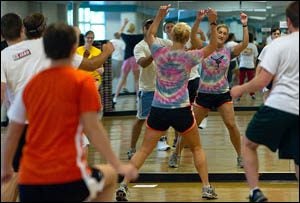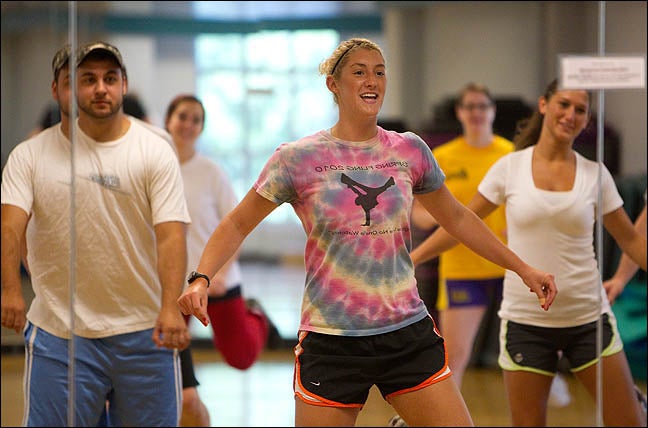FIT FOR LIFE: ECU keeps required exercise course
Obesity rates are rising throughout the nation, but ECU’s department of kinesiology continues to battle the bulge.
Many universities around the country are tossing the requirements for a general exercise course. Yet East Carolina University is moving in the opposite direction. It continues to require students to take the course in order to graduate.
“Requiring college students to participate in an exercise science class taught by proficient instructors has been proven to provide the skills necessary to help young adults develop healthy lifelong habits,” said Glen Gilbert, dean of the College of Health and Human Performance.
College is a time when many young adults start to develop sedentary behaviors, Gilbert said. He sees a course such as ECU’s exercise 1000 (Lifetime Physical Activity and Fitness Program) as a fundamental need that can counter unhealthy habits.
“If all universities provided that opportunity for students, we would likely see improved health behaviors,” Gilbert said.
“The course helped me stay motivated to exercise regularly and stay in shape …” said Carolyn Dawes, a junior from Charlotte, who took EXSS during the second summer session. “I will definitely use the skills I learned in my future workouts.”
Pennies on the Dollar
Many universities are cutting exercise courses because of recent budget cuts and financial limitations. ECU, however, plans to keep the required course in its foundations curriculum to expose students to physical activity experiences and knowledge though each of its components: aerobic, muscular strength, flexibility, stress management, energy balance and exercise.
In the long run, working an exercise routine into one’s daily life can save thousands of dollars, said Dr. Tim Gavin, professor of physiology.
“A lot of people can’t afford pharmaceutical or surgical solutions to weight loss,” he said. Exercise, however, is effective and cost efficient.
He said that the exercise course gives students a toolset of healthy habits to use in their daily lives in college and throughout the rest of their lives.
“Many people do not know the first place to start living an active, healthy lifestyle,” said Gavin. Just like people need a skill set to manage finances and work, they need one to manage healthy habits, and college is the first place they can start, he said.
If an adult is able to maintain a healthy lifestyle, their chances of surviving a heart attack or stroke are greater, said Gavin. Not only does an active lifestyle mitigate consequences, but it also improves mood and cognitive function, he said.
Beyond ECU
One of the main goals of the course is that students leave with the skillset to continue exercising even after they graduate.
Once students graduate, said Gavin, they will have to learn how to balance even more priorities, and need to learn how to maintain exercise as a top one.
The course offers students specific tools they can use to lead a healthy life after they graduate. One example: Showing them the benefits of a mobile gym.

ECU students join in an aerobics class as part of the required curriculum at ECU.
By using everyday items like a chair, students can find easier or alternative ways to be physically fit, said Rebecca Davis, who teaches LPAF classes.
Students are also required to keep logs that detail their progression in the class, and help them analyze their strengths and weaknesses.
Students’ level of physical activity is measured at the beginning and at the end of the course. The 2010-2011 Foundation Curriculum Assessment Report, which records students’ progress after taking a core class, showed an increase in regular participation in moderate to vigorous physical exercise or activity as a result of taking the class.
Learning lifetime health skills
Some students who completed exercise 1000 during the summer sessions said the course changed how they think about fitness — and habits.
“This class has taught me the rights and wrongs of being fit and healthy along with exercising correctly,’” said Queenie Huynh, a senior from Raleigh who took the course during second summer session.
“You get to do fun activities while actually getting a workout,” said Chris Hardison, a junior communications major from Williamston.
One change is in store for exercise 1000 students for fall 2011: no more required swim test.
In the past, ECU required all students to complete a swim test in order to graduate. Starting in the fall of 2011, students will no longer be required to take this swim test. Many students were putting off an exercise course because they feared taking the swim test, said Dr. Stacey Altman, chair of the department of kinesiology.
Now, students like senior Colleen Minan of Falls Church, Va., can register for an LPAF course with less to worry about. “I can actually look forward to enjoying the exercise class, a class I appreciate, instead of stressing about the swim test. It will be one less thing to worry about during my senior year.”
Gilbert, the health and human performance dean, said learning healthy habits is part of a student’s university education. That’s why exercise 1000 remains a required course here.
“ECU demonstrates that we care about the health of our students,” he said.
###
